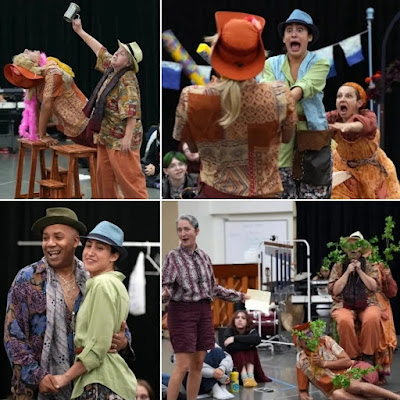Our story revolves around shipwrecked male and female twins who are separated, each thinking the other is drowned. Viola (recent U of M/Guthrie BFA graduate Dariana Elise Pérez) decides to disguise herself as a man, as one does in such situations, calling herself Cesario and going into service for the Duke Orsino (Will Sturdivant). On his behalf she woos the mourning Olivia (Katie Bradley, continuing "the year of Katie Bradley"), who wants nothing to do with the Duke but falls for young Cesario, who in turn is in love with the Duke. Viola's twin Sebastian (also Dariana) shows up later causing much amusing Shakespearean confusion. Meanwhile, Olivia's handmaid Maria (Maggie Chestovich), her kinsman Sir Toby the buffoon (Karen Wiese-Thompson), and his equally ridiculous friend Sir Andrew (Ryan Colbert) play a cruel trick on another member of her household, Malvolio (Mo Perry), using his love for Olivia to humiliate him. It's all tied together with music, "the food of love," and in the end everyone lives happily ever after as true identities are revealed.*
Artistic Director Marcela Lorca directs the piece with Assistant Director Peter Vitale, who has passed his usual role as Music Director/Composer/Soundscape Creator to Isabella Dawis, who does a wonderful job in this role for the first time. In the post-show discussion I attended, they talked about how the music and sound also perform functions normally provided by lighting or set or other technical elements that TTT does not have in their "all the lights on" performance style. In this way the sound design always plays an important role in TTT shows, helping to shape and give color to the story, but Twelfth Night has so much music in the script that it's almost a musical. There are several songs, for which Isabella composed the music, many of them sung by the delightful Brian Bose as the fool Feste (showing off with handstands and cartwheels like any good fool). "If music be the food of love, play on," and they do - Isabella on many instruments, joined occasionally by cast members playing instruments or singing.
The unique thing about TTT is that the actors perform literally a few feet in front of you, looking the audience in the eye, giving someone a wink or a conspiratorial pat on the shoulder, muttering an aside that only a lucky few can hear. The cast is so present and playful, somehow both totally in the play, and right there in the room with us, leading us through this experience of collective imagination, which all theater is, but none more tangibly so than TTT. Most of the cast has performed with TTT before, which makes one think that the experience is as special on the performance side as it is on the audience side. The sole actor making her debut with TTT, and I believe she said also her professional theater debut, is Dariana Elise Pérez, who is wonderful in the dual role of the twins, transforming from Viola to Sebastion with the aid of a reversible vest and hats, but more so with the slightly different timber of her voice and the way that she stands and carries herself. She fits right in with this company of TTT and #TCTheater vets.
TTT travels light, with minimal set design and costumes, but that only makes it more creative and charming. The set pieces consist of blue fans and flags representing the sea, a couple of half-arches with different accents representing the different homes, and some painted wooden stepladders. As we learned in the talk-back, the costumes (and music) are inspired by Albanian culture, the modern country where Illyria was located. This means full layered skirts, floral patterns, fringe and beads, and lots of jewelry for all; the beach-side location seen in sandals and shorts. As mentioned, the Viola/Sebastian switch is cleverly and simply done, as are other character changes. (Set and prop design by Mina Kinukawa, costume design by Nat Koch-Smith.)
Visit charming Illyria now through November 19, told in the one-of-a-kind Ten Thousand Things style.
 |
| photos courtesy of Ten Thousand Things |
*Plot summary borrowed from what I've written about previous productions.

